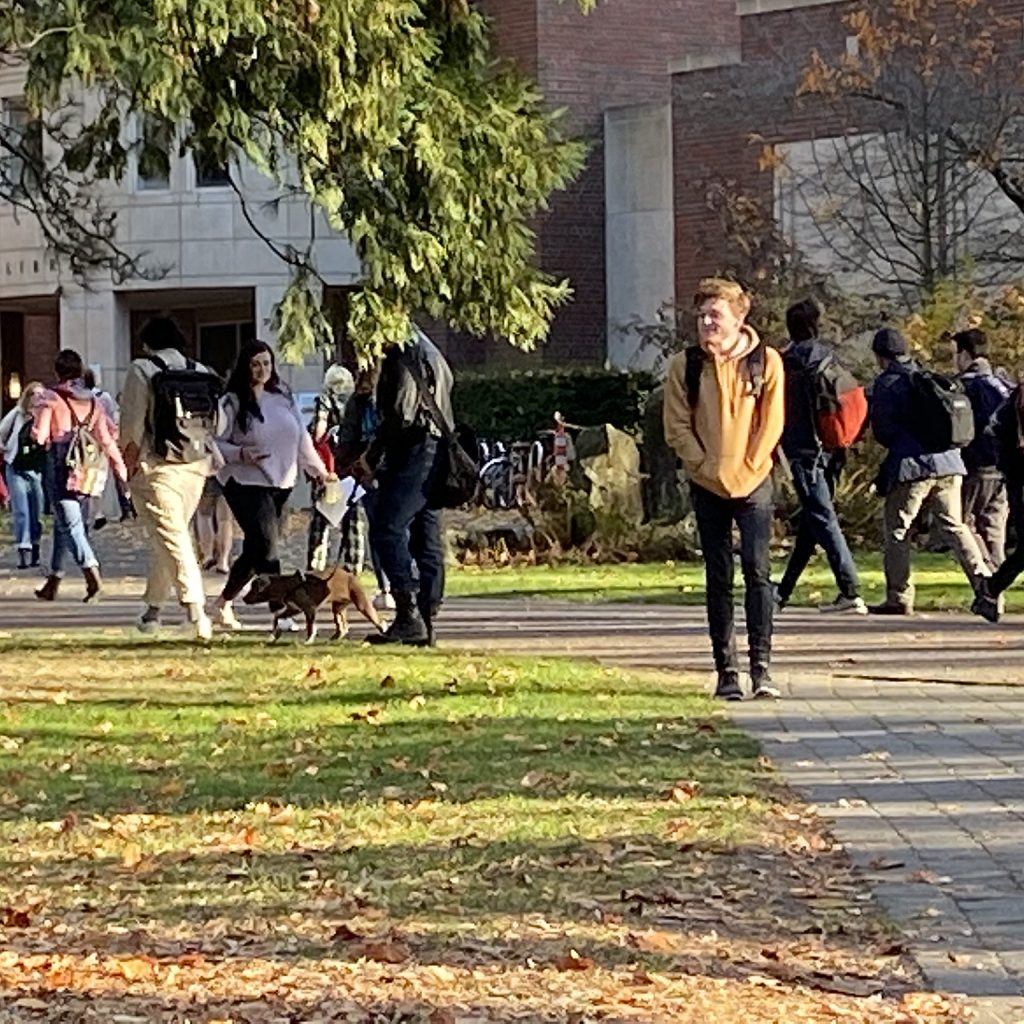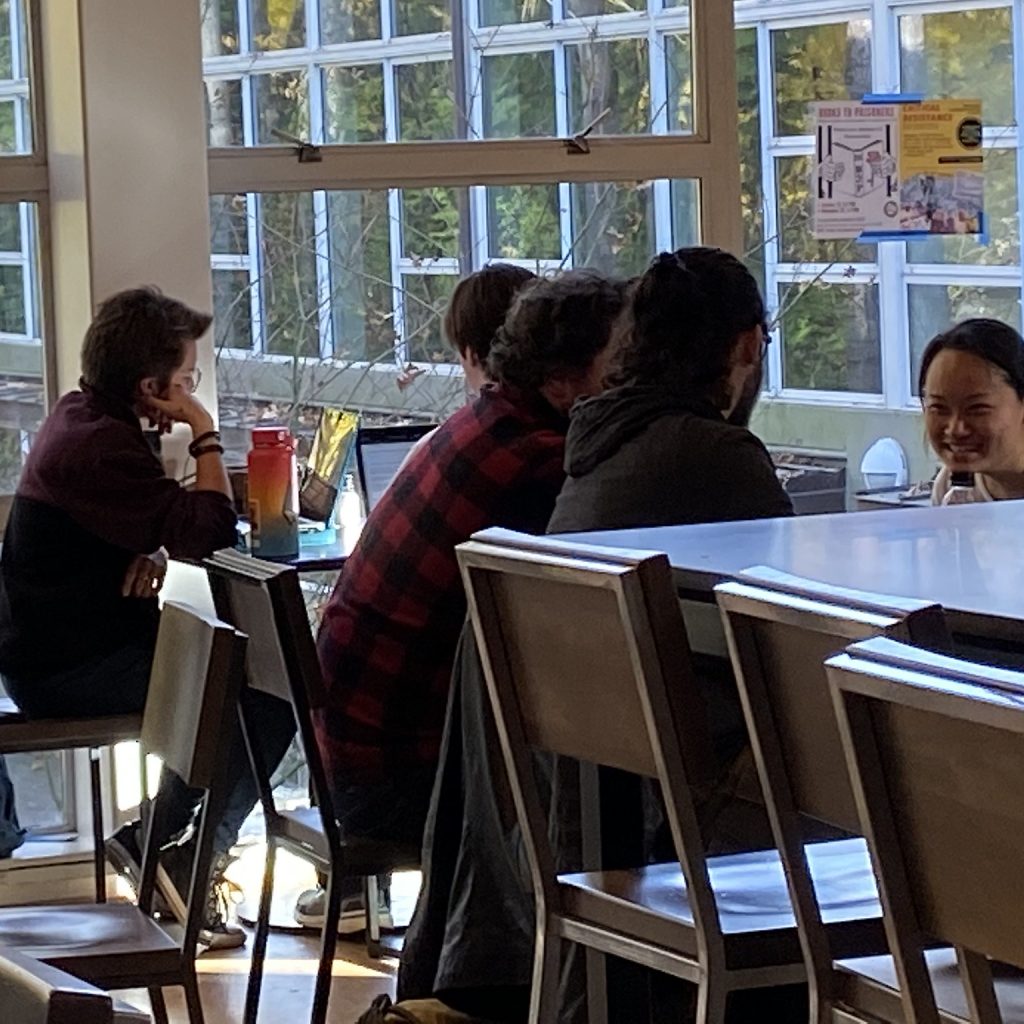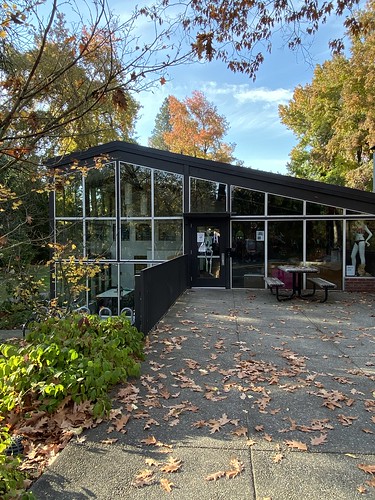Reed College Visit
Reed College
We were led to the information session by a student with understated pink hair, a pink dress, and pink boots. We walked through a wood paneled ceiling chapel into an information session with an admissions officer who had graduated from Reed College with a biochemistry degree the previous May. This was the most interesting information session we had ever attended. Our small tour group was seated around a square conference table and the first thing our admissions officer did was to ask each prospective student what societal problem he/she would like to solve and what disciplines/knowledge would be required to solve that problem (e.g. Anthropology, Political Science, Economics, Social Psychology, Sociology, Analytics, Communication, etc). We were blown away by how engaged the kids were and how thoughtful their answers were. It felt more like a seminar in college than an admission information section. And this is Reed.

Reed was founded with the vision that knowledge is gained and created and anyone can come to learn. Reed’s first class in 1915 of 45 people was half female. This history informs the campus community— Men, women, diverse socio-economic backgrounds, people of color, etc.
Academics
At Reed the focus is on learning for the sake of learning and for that reason, students are not made aware of their actual grades and instead receive detailed feedback and comments from their professors.
The average class size is 16 and most classes are taught as “conferences”, which are seminar style discussions guided by a Professor but led by students. Reed wants students to take control of their own education. Most “conferences” start with a problem and then look at cross-disciplinary causes, impacts, and solutions. Professors are focused on teaching critical thinking and effective communication.
There are several academic requirements at Reed including Group Requirements, Major Requirements, a required class called Humanities 110, and a required senior thesis. Reed offers 40 different majors, 15 of which are interdisciplinary. The only minors offered are in language.
Group requirements are mandatory classes outside of a students major. Students must take three classes in each of three groups: Humanities and Language, Social Sciences, and STEM. Again, the focus is knowledge acquisition for the sake of knowledge acquisition and taking an interdisciplinary approach to solving problems. Our admissions officer explained how he learned the substance of Biochemistry through his major classes but also learned to consider the impact of science on society, culture and religion, as well as how to effectively communicate what he learned to non-scientists through his group requirements.
Humanities 110 is the only lecture class at Reed; it’s best described as an interdisciplinary walk through the histories, cultures and civilizations of the world, including anything from ancient civilizations in Mexico City to the Harlem Renaissance. The entire freshman class is in a lecture hall and every day there is a different professor who lectures. Students write seven different papers and will then go to “paper conference” for a 30 minute meeting to discuss their work with the professor.
Finally, all seniors are required to do The Reed Thesis, which is described as “an intellectual adventure”. With support from a Reed professor, seniors explore a problem or answer a significant question. Not surprisingly there is an incredible range of topics; examples include Plastic Eating Germs, The Republic of Plato, What is Religion?, and The Music Videos of Beyoncé. All theses are bound and permanently housed in the stacks of the impressive Thesis Tower in the library.
Social Life

Reed students are able to participate in plentiful organized events on campus. They especially love dances and have themed dances from 80’s music to disco nights almost every other weekend. Students also enjoy having deep philosophical discussions and debating different ideas — the wackier the better. Our tour guide, a political science major from Texas (and black belt in Taekwondo) said she knew she was meant to be at Reed when she showed up at a party with a group of Reedies and left the party with a totally different group of students, staying up until 3:00am talking and debating.
Students are hyper involved in learning and also extracurricular activities. There is a strong arts culture as well a strong outdoor culture. Students can enter a lottery for free trips ranging from Hawaii to white water rafting for a week in the Pacific Northwest.
While there are no varsity sports teams, there are lots of club and intramural sports and students fulfill their three semester PE requirement with classes ranging from horseback riding to archery to meditation to Tai Chi. We saw a Tai Chi class on the beautiful main lawn while touring campus.
Student Body
The student body is small, with only 1,500 students. The admissions counselor joked that there are more trees than people at Reed. Reedies are known to be independent — they know how to figure out how to do things on their own.
As we walked the campus we saw the full gamut of hair and dress: pink hair, blue hair, big hair, long hair. Man buns, leggings, boots, cool dresses, jackets with tweed elbow patches, scarves, and beanies. Reed students are nothing if not individuals. The students we spoke with described Reedies as: Intellectual, Groovy, Socially-Aware, Thoughtful, Love to learn for the sake of acquiring knowledge, Internally Competitive but Collectively Collaborative.
They love learning and the stranger the topic the better. We saw low key thoughtful intellectuals and super passionate dynamic learners. Even the prospective students on our tour were asking super intellectual questions. The thing that ties them all together is their desire for knowledge acquisition.
Reed also has a unique “Scrounge” policy in the dining halls whereby students leave their leftover food on a table for anyone to claim. And claim it they do. One of the students on our tour said her leftover French fries were scooped up immediately. (There is a strict policy for sick students to refrain from leaving their food.) Below is a copy of the Scrounge Commandments.
Surrounding Area
Reed is located in an upscale residential section of Portland in the Sellwood district. Sellwood has tons of cute, Portland style shops inclusive of a food pod. A food pod is a collection of interesting, ethnic food-truck like stands with seating in the center. There are several other charming areas nearby including a section with great thrift stores.
Downtown Portland is a 15-minute drive and Mt. Hood and other hiking and outdoor areas are very close.
Career Support
75% of students get an advanced degree. Many go on to PhDs.
Admissions and Financial Aid
Admissions looks for bright, smart students as Reed is a highly selective college. The average accepted GPA range is 3.6-3.8. The average ACT range is 33-34 and the average SAT is 1400.
Letters of recommendation are very important as are essays. Admissions Reps want to know: Who is this person in their day to day life? What will they bring to our community?
Reed offers need based aid only and meets full need, however they are need aware. The average financial aid package is $45K per year. Most of aid is grant money. It has the second largest endowment in Oregon. They accept roughly 31-33% of the students who apply and students have a higher chance of acceptance by applying EA or ED.
Summary
Reed is a great fit for quirky, intellectual, liberal, hard working students who might enjoy the laid back vibe and outdoor culture of Portland.
Address: 3203 SE Woodstock Blvd, Portland, OR 97202
Phone: (503) 771-1112

